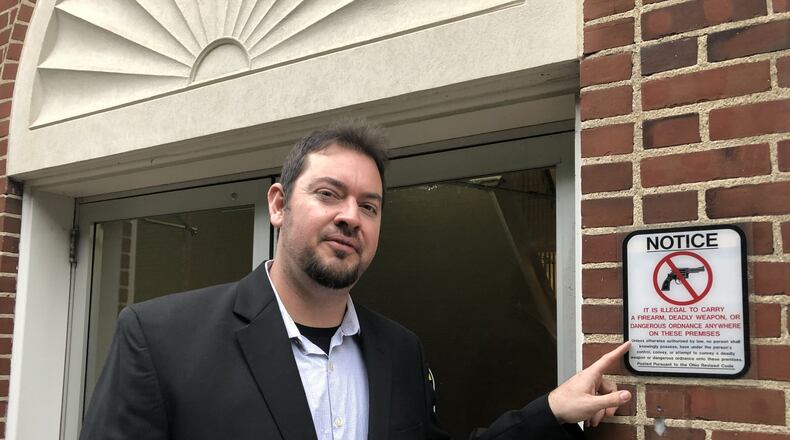“I’m not a social-justice warrior,” said Councilman Joe Shafer. “This has nothing at all to do with that.”
Shafer first raised the issue, prompting research by Law Director Mark Yurick on whether those council members with conceal-carry permits could bring guns to meetings.
That led to a work session that ended with council directing Yurick to draft local law counteracting state law prohibiting guns and authorizing signs warning those entering Lebanon City Hall.
RELATED: Butler County officials debate bringing guns to meetings
Shafer, along with Vice Mayor Mark Messer, expressed concern that signs warning those entering not to bring guns or other deadly weapons have the opposite effect on those bent on violence.
During the work session, Messer said active shooters go to public buildings — where guns are prohibited — to carry out their attacks.
"They are all gun-free zones. Imagine that," Messer said during the Jan. 7 council session.
If passed, the law could set Lebanon apart as one of the only Ohio cities to permit council members to bring guns to meetings.
Wyoming, north of Cincinnati, passed such a law but rescinded it following backlash.
Monroe debated, but ultimately rejected, the idea.
In Shelby, Ohio, Section 678.17 permits conceal-carry licensees to bring their guns into public buildings, except the courthouse.
“This is the second round of legislation that seeks to permit our local citizens to have the increased ability to their own self-defense within our community,” Shelby Councilman Steve McLaughlin told the Richland Source. “This legislation will effectively permit the administration to take the gun-free zone signs off the city buildings, minus the Justice Center.”
To take such a step, Lebanon could take advantage of a loophole for “multi-use buildings,” advised Yurick, citing a Texas case.
In drafting the ordinance, Yurick recommended “the narrowest exception,” limited to specific hours when other uses, such as Lebanon Municipal Court, weren’t taking place in the building.
“During our meetings, we have a lack of security when court isn’t in session,” Shafer said last week, pointing to the signs banning weapons. “That leaves us vulnerable.”
“I wanted to establish a safer environment in our building as we conduct our meetings without adding significant cost to the taxpayer,” said Shafer, elected in November.
Shafer said he and other council members were conceal-carry permit holders with background checks and versed in the proper use of a firearm, including when and where they should pull the trigger.
“We can just handle it ourselves,” he said. “You are kind of offering yourself as a protector of the public.”
RELATED: Lebanon elects two new city council members
Shafer, who is armed “everywhere I go, unless it’s prohibited,” said his motivation wasn’t out of concern for his personal safety or because he felt a high threat level.
“I don’t get nervous in there without my firearm, but you never know when something’s going to happen,” he said.
City council members are “the closest form of government,” who see constituents on a daily basis, Shafer added.
“Carrying one, it improves the manner in which you engage with the world,” he said.
Yurick advised the council that it could be subject to lawsuits claiming negligence by permitting conceal-carry permit holders to bring guns into a building where guns are prohibited by state law advertised on signs on the public entrance doors to city hall.
He also said “there’s no case law” on whether immunity for governments would protect the city in the event the city ordinance resulted in injury, death or loss of property.
Also, such a law would likely result in other conceal-permit holders bringing guns to meetings.
“There’s no way to say its only council people,” Yurick said.
As an alternative, he suggested assigning a police officer or hiring private security.
Councilman Doug Shope suggested the ordinance could permit conceal-carry permit holders at the city’s fire stations. Shope suggested altering the signs to indicate the prohibition was only in force from 8 a.m.-5 p.m, Monday-Friday, or when night court was in session.
The other new council member, Adam Mathews, favored Yurick forming a proposed ordinance for further discussion on permitting council members with conceal-carry permits to bring their guns to meetings.
MORE: Report shows nearly 685K Ohioans have conceal weapons permits
Councilwoman Krista Wyatt suggested employing the metal detector used by the municipal court to avoid the cost of the insurance and exposure to lawsuits.
Councilwoman Wendy Monroe, who owns a local gun business, also disagreed with using private security or police, suggesting the city and the conceal-carry holders would be within the law and protected from lawsuits if a council member used a gun in the right circumstances.
“Even if a whack-job comes into a meeting, that’s a criminal offense,” Monroe said. “Why is the city out?”
Shope suggested the exception be limited to council members.
“Nope,” Mayor Amy Brewer responded.
”I don’t care if other people carry weapons,” Messer added, noting guns were pervasive in society.
Wyatt said, “I’d rather see what other cities are doing.”
Messer, with support from Monroe, responded: “I don’t care what other cities are doing. I’d like to see a draft.”
One sticking point could be additional insurance costs for “deadly weapons coverage,” Yurick said.
RELATED: Monroe makes decision on council members carrying guns in meetings
In May 2018, Robert Beglin of USI Insurance Services told Monroe City Council the base rate would be about $400 a year per council member and would be subject to other additional costs.
Beglin said he knew of no non-school public entities that allow council members or the general public to carry concealed weapons at their public meetings.
“One carrier was not sure if they could cover this and three others have not responded,” Beglin said. “It’s such an unknown issue for us.”
Lebanon was awaiting liability insurance quotes before moving forward, according to Yurick.
Police Chief Jeff Mitchell said he had no objections.
“It’s a legislative matter,” Mitchell said.
Staff writer Ed Richter contributed to this report.
About the Author

